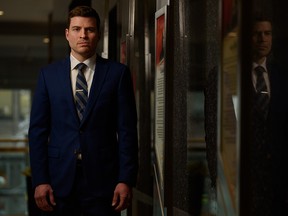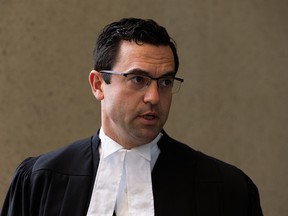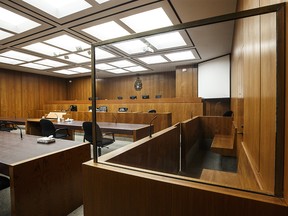By Emily Mertz Global News
Posted August 27, 2021

For the first time, Sept. 30 will mark the National Day for Truth and Reconciliation. Allison Bamford explains who gets it off and how others are recognizing a date – Aug 18, 2021
While the government of Alberta “encourages all Albertans to reflect on the legacy of residential schools” on Sept. 30, it’s leaving the implementation of a statutory holiday up to individual employers for provincially-regulated industries.

In June, Ottawa declared Sept. 30 the National Day for Truth and Reconciliation — a federal statutory holiday that is meant to give public servants an opportunity to recognize the legacy of residential schools.
The designated paid holiday for federal employees also addresses one of the 94 calls to action from the Truth and Reconciliation Commission.
READ MORE: There’s a new federal holiday in September. What does it mean for you?
“For provincially-regulated industries, the question on a work holiday is a decision for individual employers, unless an employee’s employment contract or collective bargaining agreement specifically grants federally-regulated holidays,” explained Adrienne South, press secretary for Alberta’s ministry of Indigenous Relations.
The province encourages reflection, and will lower flags on Alberta government buildings on Sept. 30 “to honour lives lost at residential schools, and commemoration ceremonies will take place.
“We must not limit our acknowledgement to the legacy of residential schools to just one day. Alberta’s government will work with First Nations and Métis communities in establishing a permanent memorial on the Alberta legislature grounds for the victims of the residential school system,” South said.
She added the province is “committed to implementing the Truth and Reconciliation Commission’s provincial calls to action, including helping Indigenous Albertans reclaim their traditional Indigenous names.”
However, the Assembly of First Nations Alberta Association said it’s upset the provincial government is not considering legislation to widely observe Sept. 30 as a statutory holiday.
“There have been too many stories in recent days of this provincial government ignoring First Nations peoples and communities in the province as of late, enough is enough,” Regional Chief Marlene Poitras said in a news release Friday.
“Why won’t the government step up and acknowledge this day, which directly responds to the TRC calls to action to bring more awareness to the struggles Canada’s First Peoples have gone through in dealing with colonization?
“This refusal to formally acknowledge the Sept. 30 federal holiday within Alberta flies in the face of reconciliation with First Nations and shows a disdain and lack of care or respect for Alberta’s Indigenous population.”
Poitras also pointed to concerns raised by an Alberta First Nation about not having adequate access to the referendum questions and senate vote being included in many Oct. 19 municipal elections.
“I have also been told that the government is not taking any steps to ensure that First Nations can participate effectively in referendum items during upcoming municipal elections in regards to Daylight Saving and the equalization formula.
“While $10 million is being funneled into municipalities to support ease of voting on these items, no booths are being set up on the Nations, who are not municipalities and do not follow the same electoral rotation as other communities.
“Instead, we are told: ‘drive to the nearest community.’ For some nations in Alberta, this is an over 100-kilometre trek in one direction. For others, they are fly-in communities and are left without any options to participate in the democratic process.”
Poitras says this sends a message to First Nations peoples that their voices don’t matter.
“I call upon the government of Alberta to course correct these actions immediately, set up polling stations on referendum items on reserve and also to acknowledge the Sept. 30, 2021 National Day for Truth and Reconciliation.”
Elections Alberta and the ministry of Municipal Affairs confirmed Thursday some people will have to travel to a nearby municipality or vote by mail to participate.
“Not every community hosts an election this fall; summer villages, improvement districts, special areas, First Nations, and the Alberta side of the City of Lloydminster do not have municipal elections this October,” Minister of Municipal Affairs spokesperson Mark Jacka told Global News.
“To ensure easily accessible voting information as well as easy access to voting opportunities, partnering communities will provide First Nations residents with election notification and the information required to cast their ballots.”

The Alberta Union of Provincial Employees (AUPE) said Aug. 25 it was filing formal policy grievances against employers, including Alberta Health Services (AHS), that are refusing to acknowledge the newly created National Day for Truth and Reconciliation.
The union said some employers “are not honouring the new holiday” despite “collective agreements which compel the employers to acknowledge holidays created by the federal government.”
READ MORE: Alberta pledges $8M to help First Nations locate and honour graves at residential schools
However, a spokesperson for AHS told Global News the health agency “may or may not be obligated to recognize a new federally-regulated holiday as part of signed collective bargaining agreements with unionized employees.”
The issue is being reviewed, said Kerry Williamson.
“AHS has been working with stakeholders, including the Wisdom Council, on how to best recognize the day in a meaningful way and planning is underway.
“AHS has been recognizing Sept. 30, Orange Shirt Day, for many years,” Williamson said.

Meanwhile, Saskatchewan has not declared Sept. 30 a provincial holiday but it falls on the same day as provincially-proclaimed Orange Shirt Day — a day on which people honour residential school survivor Phyllis Webstad, who had her orange shirt taken away on the first day of school.
“We continue to proclaim Sept. 30 as Orange Shirt Day and recognize it as an important day of remembrance for those who have suffered harm and to honour those lives that were lost at residential schools,” said a government of Saskatchewan spokesperson.
Employees still have to work that day, but all provincial government buildings will lower flags to half-mast.
Similarly, in Saskatchewan schools, staff and students will be in the classroom on Sept. 30.


Alberta First Nations are angry over the UCP government’s plan to let employers decide whether or not they will recognize the National Day for Truth and Reconciliation as a statutory holiday.
The federal government recently passed legislation to give that designation to Sept. 30 and make it a federal stat holiday, giving Canadians an opportunity to recognize the brutal hardships endured by Indigenous people in the residential school system and honour Indigenous legacies.
It is up to each province and territory to decide if it will follow Ottawa’s lead and make the day a holiday. The UCP government has decided to leave it to employers in provincially regulated industries as to whether they’ll give their staff that day off work.
Already some organizations are making Sept. 30 a day of special recognition. The Calgary Catholic School District and Calgary Board of Education are marking the day by suspending classes for students.
The government of Alberta encourages all Albertans to reflect on the legacy of residential schools, Adrienne South, press secretary for the ministry of Indigenous Relations, said in a statement.
“For provincially regulated industries, the question on a work holiday is a decision for individual employers, unless an employee’s employment contract or collective bargaining agreement specifically grants federally regulated holidays,” South noted.
She said the province on that day will also be lowering flags to half-mast “to honour lives lost at residential schools, and commemoration ceremonies will take place.”
But that isn’t sufficient, says the Assembly of First Nations Alberta Association, which accused the UCP government of giving short shrift to reconciliation by not declaring a statutory holiday.
“There have been too many stories in recent days of this provincial government ignoring First Nations peoples and communities in the province as of late; enough is enough,” Regional Chief Marlene Poitras said in a statement Friday.
“This refusal to formally acknowledge the September 30th federal holiday within Alberta flies in the face of reconciliation with First Nations and shows a disdain and lack of care or respect for Alberta’s Indigenous population.”
Poitras said fully honouring a day of reflection would fulfil the Truth and Reconciliation Commission’s call to actively promote awareness “to the struggles Canada’s First Peoples have gone through in dealing with colonization.”
South said remembering the legacy of residential schools shouldn’t be limited to one day and that the government will collaborate with First Nations and Metis communities to establish a permanent monument to that history on the legislature grounds.
“Those who were so deeply affected by the terrible legacy of residential schools will forever be remembered,” she said.
The government will also continue to fulfil the TRC’s vision by restoring Indigenous names, such as a recently renamed mountain near Canmore.
The B.C. government has advised public sector employers to give staff the day off on Sept. 30.
“Our government is calling on all of us who deliver services to the public to use this opportunity to consider what each of us can do as individuals to advance reconciliation with Indigenous peoples and to recommit to understanding the truth of our shared history,” Murray Rankin, Minister of Indigenous Relations and Reconciliation, and Selina Robinson, Minister of Finance said in a joint statement in B.C.
The Alberta Union of Provincial Employees has filed a formal grievance with the employers, including the AHS, for not honouring the federal statutory holiday.
“To stick their noses up at the National Day for Truth and Reconciliation is a new level of heartless disrespect,” said AUPE vice-president Bobby-Joe Borodey.
“How dare they refuse to acknowledge a day to reflect on such a serious issue.”
The Alberta ANF’s Poitras also castigated the province for not planning to provide polling stations on First Nations so their residents can vote in this October’s referendum questions on the federal equalization program and daylight time.
“Instead, we are told ‘drive to the nearest community.’ For some nations in Alberta, this is an over 100 kilometre trek in one direction; for others, they are fly-in communities and are left without any options to participate in the democratic process,” she said.
“This government’s actions are showing that First Nations aren’t just an afterthought, they are outright unimportant.”
BKaufmann@postmedia.com
Dave Dormer
Published Friday, August 27, 2021

CALGARY -- Calgary Board of Education schools will be closed Sept. 30 to recognize the National Day for Truth and Reconciliation.
CBE Supt. Christopher Usih made the announcement in a letter to parents and guardians on Friday.
"The intention of the day is to recognize and honour residential school survivors, their families and communities. It will also ensure that public commemoration of the tragic and painful history and legacy of residential schools remains a vital component of the reconciliation process," it read.
Related Stories
New federal holiday will help Canadians 'understand that truth' of residential schools
Union accuses Alberta Health Services of denying staff new statutory holiday
Because it is a federal holiday, the National Day for Truth and Reconciliation only automatically applies to the federal government, federal crown boards and agencies and federally regulated companies.
"However, for the 2021-22 school year, Thursday, Sept. 30 will be a non-operational day to commemorate truth and reconciliation across the Calgary Board of Education. This means there will be no classes and schools will be closed for the day," said Usih.
"As a result of this change, Friday, Dec. 10 will once again be a regular school day."
That will only apply for this year, added Usih, and CBE officials will determine how to mark the day going forward.
CBE has asked that all schools recognize Truth and Reconciliation Week from Sept. 27 to Oct. 1, 2021.
"This week will honour Every Child Matters and Orange Shirt Day and provides flexibility for schools to select at least one school day within this week to recognize Orange Shirt Day with students while learning about the history and legacy of residential schools," said Usih.
The provincial government says it will encourage all Albertans to reflect on the impact residential schools had on Indigenous people and Canada as a whole. Officials said government buildings will have their flags lowered on Sept. 30 and ceremonies are planned to take place.
As for the holiday itself, officials say the decision about whether or not employees will have a day off is up to the employer in cases where a collective bargaining agreement does not expressly say that federally regulated holidays are granted.
Nevertheless, the Alberta government says the memorial for the victims should not take place on just one day.
"Alberta’s government will work with First Nations and Métis communities in establishing a permanent memorial on the Alberta legislature grounds for the victims of the residential school system, so that those who were so deeply affected by the terrible legacy of residential schools will forever be remembered," said Adrienne South, press secretary for Indigenous Relations Minister Rick Wilson in an email to CTV News.
"The government of Alberta is also committed to implementing the Truth and Reconciliation Commission’s provincial calls to action, including helping Indigenous Albertans reclaim their traditional Indigenous names."















